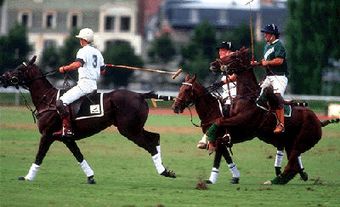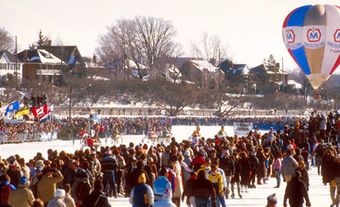
Chess
About 20% of adult Canadians play at least one game of chess a year. These games are mostly played for fun in backyards and basements, but for several thousand tournament players chess is a serious game. In 1993 there were about 5000 active players in Canada who had been "rated" according to their results in tournaments. Organized chess began in Canada in 1844 in Montréal with the establishment of the first chess club. The Canadian Chess Association was established in Hamilton in 1872 for the purpose of organizing Canadian championships. The modern descendant of this organization, the Chess Federation of Canada (CFC), has an office in Ottawa and sponsors a bimonthly magazine, En Passant. The CFC is affiliated with the World Chess Federation (FIDE) and the Canadian champion automatically qualifies for the Interzonals, the international preliminary events to determine world-title challengers.
As of 1999 there have been 74 Canadian Closed championships, played as round robins with entry restricted to provincial champions or top-rated players. Canadian Open championships, open to anyone, have been held since 1956 and usually involve 10 rounds of Swiss pairings in which players with the same scores are matched. The first Canadian Open in 1956 drew a field of 88, including a young Bobby Fischer. Kingston, 1966, was the first Open to draw over 100 players. The record entry was 648 in 1974 at Montréal. The Canadian women's championship was first held in 1975 in Ottawa, with Smilja Vujoseviç of Toronto winning the title. In 1978 in Vancouver and 1981 in Toronto the finals were won by Nava Shterenberg (now Nava Starr), a Soviet émigrée residing in Toronto. Junior championships of Canada have been held since 1970, with 12 players since 1978 in round-robin competition.
Canada has 5 women who possess the title of International Woman Master. They are Vujoseviç, Starr, Diane Mongeau, Vesma Baltgailis and Urmila Das. On the men's lists Canada has 3 international grandmasters (D.A. ("Abe") YANOFSKY, Duncan SUTTLES and Kevin SPRAGGETT) and 12 international masters (Laszlo Witt, Leon Piasetski, Bruce Amos, Zvonko Vranesiç, Camille Coudari, Lawrence Day, Jean Hébert, Bryon Nickoloff , Deen Hergott, Tom O'Donnell, Brian Hartman and Alexandre Lesiege).
Canada has been the site of some important international matches. Montréal was one of the sponsors of the 1894 world championship match where Wilhelm Steinitz lost the title to Emanuel Lasker. Bobby Fischer's path to the world championship included a candidates match in 1971 at Vancouver, where he eliminated Soviet grandmaster Mark Taimanov by winning 6 straight games. Toronto hosted the 1957 world junior championship (won by American Bill Lombardy) and a Grandmaster Invitational was held in Winnipeg in 1967 to celebrate Canada's Centennial. Bent Larsen of Denmark and Klaus Darga of West Germany were joint winners. In 1979 one of the strongest grandmaster events ever held anywhere took place in Montréal. This "Tournament of Stars" was won jointly by world champion Anatoly Karpov and former champion Mikhail Tal. In 1988 Saint John, NB hosted the "World Chess Festival," which attracted the largest gathering of top chess players in history. The highlight of the event was a spectacular win by Spraggett in a match against Soviet Grandmaster Andrae Sokolov. The following year Quebec City hosted a match between Spraggett and one of the world's top players, Soviet Artur Yusupov.
Canada has competed in the World Team championships (Olympiad) 15 times since 1939, when the Canadian team at Buenos Aires placed 17th among 27 teams. In Olympiads up to 6 players comprise a team, although only 4 boards are played in a match. Canada's 1939 team had 5-time Canadian champion J.S. Morrison on first board and 14-year-old Winnipeg prodigy D.A. Yanofsky on second. Yanofsky was the sensation of the tournament and won the prize for the best percentage on second board. Unfortunately, this Olympiad was interrupted by WWII, and it was not until 1946 at Groningen that Yanofsky had a chance to play in Europe. He had his best individual result there, defeating soon-to-be world champion Mikhail Botvinnik. After the war, a number of chess masters arrived from Eastern Europe, including Fyodor Bohatirchuk from Ukraine, ex-champion of Lithuania Paul Vaitonis and ex-champion of Hungary Geza Fuster.
In 1954 Canada competed in the 11th Olympiad at Amsterdam, finishing 14th among 26 teams. Yanofsky played top board followed by Frank Anderson of Toronto, and by Vaitonis and Bohatirchuk. Anderson had been bedridden most of his youth and learned chess during this period. He won the second-board prize at Amsterdam and repeated the feat in the 1958 Olympiad at Munich, where Canada finished 15th among 36 teams. Had Anderson's ill health not kept him from an active chess career, he would have become a grandmaster.
At Tel Aviv in 1964 Canada had its best result yet, finishing 12th among 50 countries. The team was Yanofsky, Anderson, Zvonko Vranesiç of Toronto, who had defected from a Yugoslavian soccer team in Paris, Elod Macskasy of Vancouver and Laszlo Witt of Montréal (both Hungarian émigrés) and prodigy Duncan Suttles of Vancouver. Yanofsky had his best result ever and received the Grandmaster title. Havana 1966 was a disappointment as Canada missed the finals (finishing 23rd among 52). But Canada rebounded at Lugano 1968, taking 13th among 53 countries, and it did even better at Siegen, 1970, ending 11th among 60 countries. The powerhouse of the 1968 team was Suttles, while in 1970 Vranesiç had the best score.
In the late 1960s young Canadians were rising to challenge the immigrant masters. Lawrence Day first appeared on the team in 1968 and Bruce Amos in 1970. In the 1969 Canadian championship, Suttles took the title by a narrow 2 1/2-1 1/2 margin in a playoff with Vranesiç. In 1971 Canada played for the first time in the World Student Team championship, held in Puerto Rico, and was very successful, winning the bronze medal and missing the silver by only one-half point. The USSR won with future world champion Karpov on third board. Canada's team was Suttles, Amos, Day, Camille Coudari, Denis Allan and Peter BIYIASAS. Biyiasas advanced rapidly, winning the 1972 Closed at Toronto and the 1975 Closed at Calgary.
At the 1972 Olympiad at Skopje, Canada was passed in the preliminaries by Sweden and finished a disappointing 19th among 62 countries. Later in the year Suttles became Canada's second grandmaster with a tremendous result at San Antonio. The 1974 Nice Olympiad was Canada's worst result ever, its team finishing 24th among 73 teams, but in 1976 at Haifa Canada rebounded to take 8th place in a field of only 48 teams (the event was boycotted by the Soviet Bloc). Biyiasas led the Haifa team and picked up the first third of his Grandmaster title. Good results at Lone Pine, 1978, and New York, 1978, confirmed his title just before the 1978 Closed in Toronto, where Jean Hébert of Québec City was the winner. Biyiasas represented Canada in the 1978 Olympiad at Buenos Aires, where he had a prizewinning score on second board, powering the team to a tie for 7th to 11th in a field of 66 countries. In 1979 Biyiasas immigrated to the US.
In 1980 at Malta, Canada finished by sharing 8th to 9th in a record field of 82. The team was Hébert, Day, Yanofsky, Yugoslav émigré Milan Vukadinov, Vranesiç and Allan. At Malta Canada also played in the women's Olympiad, finishing 17th to 24th in a field of 42 countries. The team was Nava Shterenberg, Céline Roos (a French émigrée residing in Montréal), Urmila Das (a Czech émigrée residing in Calgary) and Angela Day. The 1982 Olympiad was held in Lucerne, Switzerland. Canada's men's team shared 15th to 20th in a field of 92 countries and the women's team finished 17th to 22nd in a field of 45. In 1984 in Thessaloniki, Greece, Canada's men's team shared 17th to 20th in a field of 91 countries and the women's team finished 17th in a field of 51. That year, Céline Roos won a gold medal for second board.
In the 1986 Olympiad, held in Dubai, United Arab Emirates, 108 men's teams competed. Canada shared 18th to 23rd and no women's team was sent that year. The 1992 Olympiad, held in Manila, saw Canada's rising star Alexandre Lesiege play very well and score a brilliant victory against one of the worlds leading players. Lesiege is the current Canadian Junior chess champion as well as the Canadian Mens chess Champion. Everyone agrees that Alexandre (a native of Montréal) will soon achieve Grandmaster status.
In July 1980 Igor Ivanov took advantage of the Gander stopover on the Havana to Moscow air route to defect to Canada. Within a year the Russian had firmly established himself as Canada's top player. At the 1981 Closed in Montréal he won easily ahead of Kevin Spraggett and Hébert. Ivanov has since become an American citizen.
In 1981 Suttles became Canada's first postal grandmaster. After an absence of 6 years from over-the-board play, Suttles shared first place with English grandmaster Tony Miles in an international Swiss at Vancouver in 1981. Suttles has an international reputation as one of the pioneers of modern chess strategy, and many of his novel ideas have been adopted by modern masters. Because of Canada's geographical remoteness from the European mainstream of chess theory, Canadians have often adopted openings unusual for their time. N.M. MacLeod, who represented Canada in the great 1889 New York tournament (the de facto Candidates of its day), specialized in what later became known as the Hippopotamus Defence; W.H.K. Pollock at Hastings 1895 played the Modern Benoni Defence, then quite unexplored. Canadian style in chess involves noncommittal preservation of options often connected with a slow development of the pieces.

 Share on Facebook
Share on Facebook Share on X
Share on X Share by Email
Share by Email Share on Google Classroom
Share on Google Classroom


